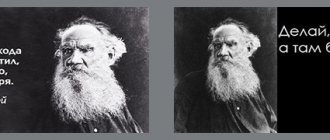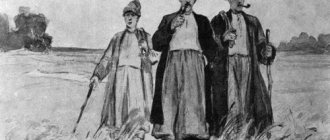Aphorisms and quotes
Nikolai Vasilyevich Gogol. Portrait by F. A. Moller 1841
Nikolai Vasilyevich Gogol
(surname at birth Yanovsky, from 1821 - Gogol-Yanovsky; born March 20 (April 1), 1809, Sorochintsy, Mirgorod district, Poltava province - February 21 (March 4), 1852, Moscow) - Russian prose writer, playwright, poet , critic, publicist, recognized as one of the classics of Russian literature. He came from an old noble family of the Gogol-Yanovskys.
When a person falls in love, he is like a sole, which, if you soak it in water, bend it, and it will bend.
Look at whether you love others, not at whether others love you.
Whoever wants to go through his life honestly must keep in mind in his youth that someday he will be an old man, and in his old age remember that he, too, was once young. Living in the world and not having anything to indicate your existence seems terrible to me.
There is no death in the literary world, and the dead also interfere in our affairs and act together with us, just like the living.
Are there really such fires, torments and such strength in the world that would overpower the Russian force!
Misfortune softens a person; his nature then becomes more sensitive and accessible to the understanding of objects that surpass the concept of a person in an ordinary and everyday situation; It’s as if it all turns into heated wax, from which you can sculpt whatever you want.
It now seems to everyone that he could do a lot of good in the place and position of another, but he just cannot do it in his own position. This is the cause of all evil.
If one senseless whim was the cause of worldwide upheavals and forced the smartest people to do stupid things, what would have happened if this whim had been meaningful and directed towards good? It is easier for a woman to kiss the devil than to call someone beautiful.
Women are such an object!.. Their eyes alone are such an endless state into which a person has driven - and remember what their name was!
Stupidity is the special charm of a pretty woman. At least I have known many husbands who are delighted with the stupidity of their wives and see in her all the signs of infantile innocence.
A.I. Ivanov. "Portrait of Nikolai Gogol." 1841 Russian Museum. Saint Petersburg. Russia.
We are maturing and improving, but when? When we comprehend a woman more deeply and more perfectly.
I swear, our women will wake up before men, nobly reproaching us, nobly whipping us and driving us with the scourge of shame and conscience like a stupid herd of sheep, before each of us has time to wake up and feel what he should have long ago prompted himself, without waiting for the scourge.
Getting married doesn't mean going to the bathhouse.
There is no bond holier than fellowship! A father loves his child, a mother loves her child, a child loves his father and mother. But that’s not it, brothers: the beast also loves its child. But only one person can become related by kinship by soul, and not by blood.
Often, through the laughter visible to the world, tears flow invisible to the world.
Laughter is a great thing: it does not take away either life or property, but the person guilty of it is like a tied hare.
In the depths of cold laughter, hot sparks of eternal, powerful love can be found.
Fearing laughter, a person will refrain from doing something that no force could restrain him from.
If the power of laughter is so great that people fear it, then it should not be wasted.
Anger is inappropriate everywhere, and most of all in a matter of justice, because it obscures and muddies it.
Anger or displeasure against anyone is always unjust; in only one case can our displeasure be fair - when it is turned not against someone else, but against ourselves, against our own abomination and against our own failure to fulfill our duty.
Nikolai Vasilyevich Gogol in a group of Russian artists in Rome. Among those depicted are architects Fyodor Eppinger, Karl Beine, Pavel Notbeck, Ippolit Monighetti, sculptors Peter Stawasser, Nikolai Ramazanov, Mikhail Shurupov, painters Pimen Orlov, Apollo Mokritsky, Mikhail Mikhailov, Vasily Sternberg. Daguerreotype of Sergei Lvovich Levitsky, 1845. It is believed that this is the only daguerreotype of N.V. Gogol.
Even if you happen to be angry with someone else, be angry with yourself at the same time, at least for the fact that you managed to get angry with someone else.
Art is reconciliation with life.
Art certainly strives for good, positively or negatively: whether it shows us the beauty of the best that is in a person, or whether it laughs at the ugliness of the worst in a person.
There is hardly the highest of pleasures than the pleasure of creating.
An incomprehensible phenomenon: what surrounds us every day, what is inseparable from us, what is ordinary, can only be noticed by deep, great, extraordinary talent.
Before you is a community - the Russian language! Deep pleasure calls you, the pleasure of immersing yourself in all its immeasurability and grasping its wonderful laws... Start from the original foundations.
Our extraordinary language itself is still a mystery. It contains all the tones and shades, all the transitions of sounds from the hardest to the most gentle and soft; it is limitless and can, alive as life, be enriched every minute, drawing, on the one hand, lofty words from the language of the church and biblical, and on the other hand, choosing apt names from its countless dialects scattered throughout our provinces, having the opportunity to do so Thus, in one and the same speech, one can ascend to a height inaccessible to any other language, and descend to a simplicity that is perceptible to the touch of the most incomprehensible person - a language that in itself is already a poet.
Portrait of N.V. Gogol, framed from a group daguerreotype by S.L. Levitsky, 1845
Moreover, our poets have done good by spreading a hitherto unprecedented euphony. I don’t know in what other literature poets have shown such an endless variety of shades of sound, which, of course, was partly facilitated by our poetic language itself.
The word of a Briton will echo with heart knowledge and wise knowledge of life; The short-lived word of a Frenchman will flash and spread like a light dandy; The German will intricately come up with his own clever and thin word, which is not accessible to everyone, but there is no word that would be so sweeping, lively, so bursting out from under the very heart, so seething and vibrantly trembling, like a well-spoken Russian word.
You marvel at the preciousness of our language: every sound is a gift; everything is grainy, large, like the pearl itself, and, truly, another name is even more precious than the thing itself.
The Russian people express themselves strongly! And if he rewards someone with a word, then it will go to his family and posterity, he will drag it with him into service, and into retirement, and to St. Petersburg, and to the ends of the world.
Our language also contributes to the formation of readers, which is, as it were, created for skillful reading, containing all the shades of sounds and the most daring transitions from the sublime to the simple in one and the same speech.
In our proverbs... one can see the extraordinary fullness of the people's mind, which knew how to make everything its instrument: irony, mockery, the accuracy of pictorial consideration in order to compose a burning word that penetrates through the nature of Russian people, teasing every living thing.
Where is the one who, in the native language of our Russian soul, would be able to tell us this almighty word: forward? Who, knowing all the powers, and properties, and all the depth of our nature, with one magical wave could direct a Russian person to a high life?
And everything is a nugget itself, a lively and lively Russian mind that does not reach into its pocket for a word, does not hatch it like a hen chickens, but sculpts it right away, like a passport, for eternal wear, and there is nothing to add later, what kind of nose or lips - one line outlines you from head to toe.
You cannot force a Russian person to speak until you anger him and completely drive him out of patience.
There is a wonderful property in human nature, and especially Russian nature: as soon as he notices that another is bending over to him in the slightest or showing condescension, he himself is almost ready to ask for forgiveness. No one wants to give in to the first, but as soon as one has decided on a generous deed, the other is already eager to outdo him in generosity.
The Russian man has an enemy, an irreconcilable, dangerous enemy, without which he would be a giant. This enemy is laziness.
Nikolai Vasilyevich Gogol. Portrait from the daguerreotype of S. L. Levitsky, 1845.
A Russian person is capable of all extremes: seeing that with the little money he has received he cannot lead life as before, out of grief he can suddenly squander what was given to him for long-term maintenance.
Many of us even now, especially among young people, have begun to boast excessively of Russian virtues and are not thinking at all about deepening them and cultivating them in themselves, but in order to put them on display and say to Europe: “Look, Germans: we are better than you.” !” This boasting is the ruin of everything. It irritates others and harms the braggart himself.
And what Russian doesn’t like driving fast!
Rus'!.. Isn’t it here, isn’t limitless thought born in you, when you yourself are endless? Shouldn't a hero be here when there is room for him to turn around and walk?
Even if you gallop from here for three years, you won’t reach any state.
All disorder comes from ignorance of one's land. Unfortunately, ignorance of our homeland is the basis of our upbringing.
This is something more than ordinary love for the fatherland. Love for the fatherland would sound like cloying boasting. Our so-called leavened patriots are proof of this: after their praise, however quite sincere, you will only spit on Russia.
The mass of the public, representing the nation in its person, is very strange in its desires... The mass of the people in this case is similar to a woman ordering an artist to draw a portrait of herself that is completely similar; but woe to him if he did not know how to hide all her shortcomings!
Fyodor Antonovich (Otto Friedrich) Moller “Portrait of N.V. Gogol” 1840. Oil on canvas Ivanovo Regional Art Museum.
What a strange fashion has started in Rus' now! The man himself lies on his side, is lazy about the real thing, and hurries the other, as if the other must certainly pull with all his might for joy that his friend is lying on his side.
Really, our human soul is like a steamed turnip.
True nationality lies not in the description of the sundress, but in the very spirit of the people.
A person is never completely right or completely wrong.
Man is such a brute that he will only get down to business when he finds out that he is going to die tomorrow.
A person who answers a question with protective words: “I don’t dare say in the affirmative, I can’t judge by first impressions” is doing well: this is what true modesty dictates; but a person who expresses his first impression in the first minute, without fear of either compromising himself or offending the tender intelligibility and sensitive strings of a friend, is a generous person.
A person is always talkative when there is a secret sweetness in his sadness.
A person is wise, intelligent and intelligent in everything that concerns others, and not himself.
A one-sided person is self-confident; a one-sided person is impudent; a one-sided person will arm everyone against himself.
A one-sided person cannot find the middle in anything.
Man is already created in such a way as to demand the eternal help of others. Everyone has something that everyone else doesn't have; Everyone has a different nerve that is more sensitive than another, and only friendly exchange and mutual assistance can make it possible for everyone to see the object with equal clarity and from all sides.
There is only one decent person there: the prosecutor, and even that one, to tell the truth, is a pig.
Money, like a shadow or a beauty, runs after us only when we run from it. He who is too busy with his work cannot be embarrassed by the thought of money, even if he does not have enough for tomorrow.
... We have many who are willing to be seconded in any matter. As soon as some place appears and there are some monetary benefits associated with it, the secretary will instantly be fastened to the side.
Our swindlers and bribe-takers know how to circumvent every decree, and for them a new decree is only new gain, a new means of cluttering up every administration of affairs with greater complexity, of throwing a new log under a person’s feet.
An example is stronger than the rules.
There is a wonderful thing in the world: it is a bottle of good wine. When your soul demands another soul to tell its whole half-sad story, climb into your room and uncork it, and when you drink a glass, you will feel how all your senses will be revived.
Architecture is also a chronicle of life: it speaks when both songs and legends are already silent.
There is a time when it is otherwise impossible to direct society or even an entire generation towards the beautiful until you show the full depth of its real abomination.
The source of poetry is beauty.
Poetry is a pure confession of the soul, and not a product of art or human desire; poetry is the truth of the soul, and therefore can be accessible to everyone.
A writer’s syllable is formed when he knows well the person to whom he is writing.
The writer has only one teacher: the readers themselves.
The duty of a writer is not only to provide a pleasant activity for the mind and taste; will be strictly exacted from him if some benefit to the soul does not spread from his writings and nothing remains from him as an instruction to people.
Just try to keep things fair from above, and from below everything will be fair on its own.
Every person should fulfill his calling on earth conscientiously and honestly.
No matter how stupid the words of a fool are, sometimes they are enough to confuse an intelligent person.
No skillful and brilliant doctor will undertake to treat a disease until he knows its entire course and all the twists and turns of the circumstances that accompanied it.
Youth is happy because it has a future.
We need tolerance; without her there will be nothing for art. All births are good when they are good in their own way.
The beginning, root and affirmation of everything is love for God. But for us this is the beginning at the end, and we love everything that is in the world more than God.
The higher the truths, the more careful you need to be with them: otherwise they will suddenly turn into commonplaces, and they no longer believe commonplaces.
Take care of yourself first, and then of others: first become purer in soul, and then try to make others purer.
Reason is an incomparably higher ability, but it is acquired only by victory over passions.
Glory cannot satisfy and give pleasure to those who stole it and did not deserve it; it produces constant awe only in those worthy of it.
Through suffering and grief it is destined for us to obtain grains of wisdom that cannot be acquired in books.
Theater is a pulpit from which you can say a lot to the world.
Only that work that forces the entire person to turn to himself and withdraw into himself is our deliverer.
One has only to take a closer look at the present, and the future suddenly appears by itself.
Instead of harshly judging your past, it is much better to be unforgiving about your present activities.
4.9 / 5 ( 303 voices)
Brief biography of N.V. Gogol
Nicholas the future writer was named in honor of St. Nicholas. According to family legend, he came from an old Cossack family and was supposedly a descendant of Ostap Gogol, hetman of the Right Bank Army of the Zaporozhye Polish-Lithuanian Commonwealth.
Nikolai Vasilyevich Gogol was born on April 1 (March 20, O.S.) 1809. His homeland was the Poltava province, the village of Bolshie Sorochintsy, Mirgorod district. He was the son of a middle-class landowner. Nikolai began receiving his education at the age of ten, entering the Poltava district school, then through private lessons, and in 1821 he left for the Chernihiv region to join the ranks of students at the Nizhyn Gymnasium of Higher Sciences.
He did not excel in his studies, which was partly explained by the poor quality of teaching in the newly created educational institution. Defects in education were compensated by the desire for knowledge of Nikolai himself and his comrades.
They organized the publication of a handwritten magazine, in which the first literary (both poetic and prose) samples of the future classic’s pen appeared. Young Gogol was passionately interested in the theater, having established himself as a good actor and decorator.
Full of great hopes, aspirations and still unclear plans, in December 1828 Gogol arrived in St. Petersburg. Harsh reality and the inability to find himself brought a bitter tinge of disappointment into his mood.
An unsuccessful attempt to become an actor, the hardships of serving in the Department of State Economy and Public Buildings and later in the Department of Appanages made the idea of devoting oneself to literary creativity more and more attractive.
However, there were also advantages to the clerical service: it allowed Gogol to get an inside look at the life and work of officials, and this awareness subsequently served him well when writing his works.
Having discovered that life in Little Russia was interesting to many, Gogol harbored thoughts about a work that, on the one hand, could come to the court, and on the other, satisfy his needs for literary creativity.
Already in 1829, “May Night” and “Sorochinskaya Fair” were written or at least begun; at the beginning of 1830, “The Evening on the Eve of Ivan Kupala” was published in the journal Otechestvennye Zapiski.
In the winter of 1831, the inspector of the Patriotic Institute, Pletnev, recommended Gogol for a teaching position, and in May introduced him to A.S. Pushkin. This event became truly fateful in the biography of the prose writer, having a huge influence on him as a person and on a writer.
In 1834, young Gogol became an adjunct in the department of history at St. Petersburg University and entered the circle of people at the forefront of Russian fiction. He perceived his service to the Word as the highest moral duty, which must be fulfilled sacredly. This period became the most intense in his literary activity.
In 1830-1832 “Evenings on a Farm near Dikanka” are published, which bring their author great fame.
The collections “Arabesques” and “Mirgorod”, published in 1835, strengthened Gogol’s reputation as a brilliant writer. Acquaintance with them allowed V. Belinsky to assign Gogol the status of “the head of literature, the head of poets.” Literary creativity became the main and only occupation of the writer from the summer of 1834.
In the same year, The Inspector General was conceived, and the plot of the work was suggested by Pushkin (the same story was repeated later with Dead Souls). In 1836, the Alexandria Theater staged The Inspector General, but the decrease in social urgency when transferring it to the stage brought disappointment to the author.
The enormous tension of physical and moral strength accumulated over several years led the writer to the idea of taking a trip abroad to relax.
He spent almost a dozen years, not counting short breaks, in various cities in Germany, France, Switzerland, Austria, and the Czech Republic. Staying outside his homeland, on the one hand, calmed him down, filled him with new impressions and strength, but on the other hand, changes were brewing in his soul, which later acquired a fatal, fatal character.
Finding himself in Rome in the spring of 1837, a city that he loved as his second home, Nikolai Vasilyevich began working on “Dead Souls,” which were conceived in 1835. In 1841, work on the first volume was completed, and in the fall Gogol returned to Russia to publish his works. With difficulty, the author gets the go-ahead for Dead Souls and publishes them in Moscow in 1842.
In the summer, the author of the poem went abroad again, moving from country to country, from city to city. The main changes took place, meanwhile, in his inner world. Gogol considered himself the creator of something providential, saw in himself a messiah called to expose the vices of people and at the same time improve himself, and for him this path lay through religion.
A severe mental crisis that broke out in 1845 prompted Gogol to write a will and burn the manuscript of the second volume of the poem “Dead Souls.” Having survived this terrible state, the writer, as a sign of deliverance from death, decides to become a monk, but he fails to realize this idea. And then he comes to the idea of serving God in the literary field.
The idea of collecting everything written in recent years was realized in the form of the book “Selected Passages from Correspondence with Friends,” published in 1847 in St. Petersburg. Due to the mentoring, arrogant tone, the vagueness of the ideological position, the reluctance to join the Westerners and Slavophiles, who in the 1840s. actively challenged each other's right to truth, “Selected Passages” remained misunderstood and condemned.
Having a hard time experiencing failure, Gogol sought solace in religion and considered it necessary to continue working only after a trip to holy places. Once again, the writer’s biography begins a period of stay abroad. At the end of 1747, Naples became his place of residence, and from there, at the beginning of 1848, he made a pilgrimage to Palestine.
In the spring of 1848, N.V.’s final return took place. Gogol to Russia. Work on the second volume of Dead Souls continued against the backdrop of intense internal struggle. The writer's health, meanwhile, deteriorated every day. The death of his good friend Khomyakova made an extremely painful impression on him and exacerbated the fear of his own imminent death.
From February 5 (Old Style), 1852, Gogol stopped leaving home and began to pray and fast with special zeal, although the time of Great Lent had not yet arrived. On the night of February 11-12, the writer burned his works, among which were the manuscripts of “Dead Souls.”
On February 18, he finally fell ill and stopped eating, refused the offered help of doctors and friends, who tried in vain to correct the situation. On February 20, the doctors who gathered for a consultation decided to treat Gogol forcibly, but this only deprived him of his last strength - by the evening he was unconscious, and on February 21 (March 4, according to the New Style) in the morning he died.
He was buried in Moscow, in the cemetery of the Danilov Monastery, which was closed in 1930. On May 1, 1931, Gogol’s grave was opened, followed by the transfer of the remains to the Novodevichy cemetery.
There is information not officially confirmed that Gogol was buried in a lethargic sleep, i.e. he was overtaken by the fate he had always feared. The death of the great writer is surrounded by a trail of mysticism, as is his life, and the aspirations of his restless soul, which are not understood by many.









